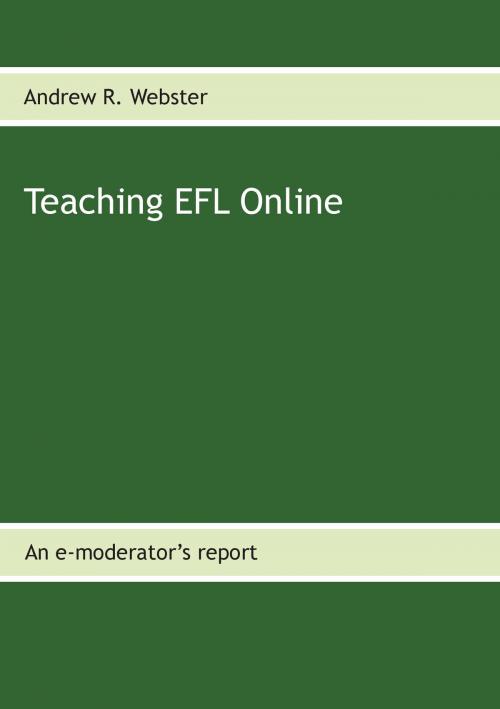Teaching EFL Online
An e-moderator's report
Nonfiction, Reference & Language, Education & Teaching, Educational Theory, Adult & Continuing Education| Author: | Andrew R. Webster | ISBN: | 9783848261192 |
| Publisher: | Books on Demand | Publication: | November 8, 2012 |
| Imprint: | Language: | English |
| Author: | Andrew R. Webster |
| ISBN: | 9783848261192 |
| Publisher: | Books on Demand |
| Publication: | November 8, 2012 |
| Imprint: | |
| Language: | English |
This work explores the role of the e-moderator, taking account of the skills required and the processes involved in creating and teaching an online English as a Foreign Language (EFL) course. It also details those theories which are applicable to online learning and how they are represented through various models, thus creating a framework to assist the e-moderation process. In particular, Salmon’s five-stage model (2004) is analysed to assess its effectiveness in helping to prepare a new e-moderator to teach in an online environment. Qualitative self-study research is conducted involving an analysis of the e-moderator’s reflective journal. This method can be particularly insightful, uncovering the e-moderator’s beliefs, perceptions and challenges encountered throughout the process. Thus, in-depth data is collected and used in evaluating an approach to e-moderation. It reveals how Salmon’s five-stage model and others can be considerably helpful, although not sufficient in themselves, for successful online teaching and learning. In this regard, a critical appraisal and detailed analysis of Salmon’s model relating to this research is conducted to assess the skills required to become a successful e-moderator. This research reveals not only the complexities, problems, responsibilities and challenges encountered but also the tremendous rewards that can be reaped from the e-moderation process. Such research can encouragingly provide other practitioners with a valuable insight into the process and leads to recommendations for further research. In conclusion, it is apparent that systematic frameworks such as Salmon’s five-stage model can be extremely useful for effective scaffolding but on their own they are not sufficient to produce a successful e-moderation process. It is suggested, therefore, that additional support and continual encouragement should be provided to motivate and engage students in both synchronous and asynchronous interactions. Moreover, consideration should be given to specific pedagogy and sociocultural factors when designing and implementing an online language course.
This work explores the role of the e-moderator, taking account of the skills required and the processes involved in creating and teaching an online English as a Foreign Language (EFL) course. It also details those theories which are applicable to online learning and how they are represented through various models, thus creating a framework to assist the e-moderation process. In particular, Salmon’s five-stage model (2004) is analysed to assess its effectiveness in helping to prepare a new e-moderator to teach in an online environment. Qualitative self-study research is conducted involving an analysis of the e-moderator’s reflective journal. This method can be particularly insightful, uncovering the e-moderator’s beliefs, perceptions and challenges encountered throughout the process. Thus, in-depth data is collected and used in evaluating an approach to e-moderation. It reveals how Salmon’s five-stage model and others can be considerably helpful, although not sufficient in themselves, for successful online teaching and learning. In this regard, a critical appraisal and detailed analysis of Salmon’s model relating to this research is conducted to assess the skills required to become a successful e-moderator. This research reveals not only the complexities, problems, responsibilities and challenges encountered but also the tremendous rewards that can be reaped from the e-moderation process. Such research can encouragingly provide other practitioners with a valuable insight into the process and leads to recommendations for further research. In conclusion, it is apparent that systematic frameworks such as Salmon’s five-stage model can be extremely useful for effective scaffolding but on their own they are not sufficient to produce a successful e-moderation process. It is suggested, therefore, that additional support and continual encouragement should be provided to motivate and engage students in both synchronous and asynchronous interactions. Moreover, consideration should be given to specific pedagogy and sociocultural factors when designing and implementing an online language course.















